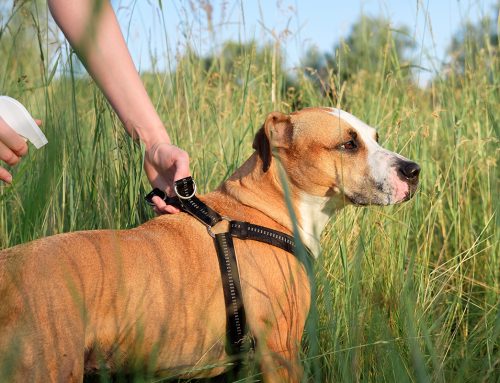March is National Pet Poison Prevention Month and the perfect time to do some spring cleaning to eliminate potential threats that could be lurking in your home. Many household items are toxic to pets, and you may be unaware that your dog or cat could be regularly having a close encounter of the poisonous kind. To help reduce your pet’s potentially harmful poison exposure risk, our Aloha Veterinary Hospital team is sharing a list of five common household pet toxins and tips to keep your pet safe.
Pet Toxin #1: Chocolate
While rarely fatal, chocolate ingestion can result in your pet becoming significantly ill. Chocolate is toxic because the food contains the chemical theobromine, as well as caffeine.
Pet Toxin #2: Medications
You can seriously poison your pet if you give them a pain reliever intended for people, or if your pet ingests one of your dropped prescription pills. Many over-the-counter (OTC) and prescription medications for people are highly toxic to pets, including:
- Nonsteroidal anti-inflammatories (NSAIDs) — Ibuprofen (e.g., Advil, Motrin) and naproxen (e.g., Aleve) are the most common toxic NSAIDs pets ingest. Humans frequently take these drugs for pain, but ingesting only one or two of these pills may cause your pet to develop stomach ulcers or kidney failure.
- Acetaminophen — Acetaminophen (e.g., Tylenol) is a popular pain reliever for people that can also be harmful to pets. Acetaminophen damages cats’ red blood cells, impairing their ability to carry oxygen throughout your pet’s body. Liver damage may occur in dogs, along with the same red blood cell damage cats experience.
- Decongestants — Decongestants, such as pseudoephedrine, cause stimulant-like effects, harming or killing pets.
- Anti-anxiety and antidepressant medications — Veterinarians sometimes prescribe pets anxiety medications. However, ensure you closely follow dosing instructions, because overdose can occur easily.
- Heart and blood pressure medications — You must keep a close eye on your pet to prevent them from accessing your heart and blood pressure medications, especially beta blockers, which may slow their heart rate and cause a life-threatening blood pressure drop.
- Attention deficit disorder (ADD)/attention deficit hyperactivity disorder (ADHD) medications — These drugs for people’s behavioral disorders are strong stimulants. If your pet ingests either of these medications, they may become agitated, and experience tremors, seizures, elevated body temperature, and heart problems.
Never give your pet a medication or supplement without your veterinarian’s consent, because your furry pal can easily overdose and die. In addition, always keep all medications out of your pet’s reach and securely store them in their original containers.
Pet Toxin #3: Food for people
Many foods that people commonly eat can be dangerous for pets. Although you may be unable to resist your pet’s begging, never give your furry pal the following human foods:
- Xylitol — Xylitol (i.e., birch sugar) is a naturally occurring substance that is widely used as a sugar substitute. A variety of self-care products for people include xylitol as an ingredient, such as oral-care products, deodorants, and lip balms. If your pet ingests a product that contains even small amounts of xylitol, they can experience a life-threatening drop in blood sugar. If your pet ingests a large amount of xylitol, they can develop liver failure. Xylitol poisoning signs include vomiting, weakness, difficulty walking, tremors, and seizures.
- Alcohol — If your pet ingests an alcoholic beverage, they can experience alcohol (i.e., ethanol) poisoning. Your pet’s gastrointestinal (GI) tract rapidly absorbs ethanol, which spreads to their brain, and within an hour, your furry pal can experience depression, loss of movement control, lethargy, sedation, and high body temperature.
- Grapes and raisins — Grapes and raisins can cause pets to develop kidney failure.
- Macadamia nuts — People enjoy macadamia nuts as a popular snack, but they can cause your pet serious problems. Pets who consume macadamia nuts may experience neurologic signs, including incoordination, muscle tremors, and an inability to walk. In addition, macadamia nuts’ high fat contact can cause your pet pancreatitis—a painful inflammatory condition that requires hospitalization and can be life-threatening.
- Onions, chives, garlic, and leeks — These Alliums contain thiosulphates, which lead to the breakdown of your pet’s red blood cells, causing anemia. Initial signs include lethargy, vomiting, and diarrhea, but as your pet becomes more anemic, signs progress to weakness, pale mucous membranes, and bloody urine.
Pet Toxin #4: Household products
Pet poisons lurk indoors and outdoors around your home. In addition to toxic foods, household cleaning products, garden chemicals, and various pest baits can poison your pet:
- Cleaning products — Your pet can ingest bleach, rust removers, drain cleaners, detergents, and numerous other household products that contain dangerous chemicals unless you securely store them and keep them out of your furry pal’s reach.
- Fertilizers — Garden and yard fertilizer contains chemical compounds and minerals that can cause electrolyte imbalances and severe gastrointestinal distress.
- Rodenticides — Many rodenticides kill rats and mice, but pets are also susceptible to these poisons’ deadly effects. You must prevent your pet from accessing rodenticides by storing them securely out of your furry pal’s reach and keeping your pet away from home areas—indoors and outdoors—where you may be using these toxins.
Pet Toxin #5: Plants

Although plants and flowers look beautiful in your home and yard, many are hazardous to your pet. When selecting plants, choose varieties that are nontoxic to pets, such as African daisies, rosemary, and snapdragons. Always avoid azaleas, daffodils, lilies, sago palms, and tulips. The American Society for the Prevention of Cruelty to Animals (ASPCA) offers a full searchable list of plants that are poisonous to pets. You can access the list by clicking here.
Although your home likely harbors several pet poisons, you can take precautions to help protect your pet from them. However, if you suspect your pet has consumed something harmful, don’t wait for them to exhibit poisoning signs. Immediately contact our Aloha Veterinary Hospital team, or the ASPCA Animal Poison Control Center.







Leave A Comment